As the leaves change colours and temperatures drop, the start of fall also signals the start of respiratory illness season. These illnesses include cold, influenza (flu), and yes, COVID-19. Here’s what you need to know when it comes to protecting yourself and others against them.
Get your fall vaccines
There’s no vaccine for the common cold, but we do have vaccines to protect ourselves against flu and COVID-19. Getting vaccinated not only protects yourself, but also protects our communities, including those who are vulnerable and have a higher risk of getting very sick or dying.
COVID-19 fall boosters
- For full protection, everyone 5 years and older is recommended to get ongoing booster doses since immunity decreases over time. For most people, it’s best to get a booster dose around periods of increased risk, like the fall respiratory illness season.
- Most people in BC are or will soon be eligible for their fall booster. Make sure you’re registered in the Get Vaccinated system so you get an invitation to book an appointment when it’s your turn.
- Bivalent booster shots will be available in clinics. This vaccine type provides an immune response against the original virus strain and Omicron variants and is expected to be effective at reducing the risk of serious illness.
- This new vaccine will be available as a booster to all adults over the age of 18 years, and youth from 12-17 years who are at higher risk of severe outcomes from COVID-19. For information on vaccine booster options for you and your family, see: Understanding your COVID-19 vaccine options.
- To find a COVID-19 vaccine clinic in your community, visit the Northern Health COVID-19 vaccination webpage.
Flu shots
- The official start date for flu season hasn't been announced yet but usually it happens around the middle or end of October and clinics start after that.
- When local flu clinics are up and running (both Northern Health and community pharmacy clinics), they get posted to the ImmunizeBC flu finder website.
- You can get your flu shot at your local pharmacy or some walk-in/travel/community clinics. Some family physicians provide flu shots too. You can find a flu clinic near you using the ImmunizeBC flu finder website.
Other ways to prevent respiratory illnesses
Besides staying up-to-date with your vaccines, how else can you protect yourself and your community from catching and spreading cold, flu, or COVID-19 germs?
- Stay home when sick. This will help prevent others in your community from getting sick.
- Wash or sanitize your hands regularly: especially before eating or after being in public spaces or handling shared objects.
- Stay healthy. Eating well, exercising, and taking care of your overall wellness helps keep your immune system strong and reduce your risk of catching or spreading illnesses.














Comments